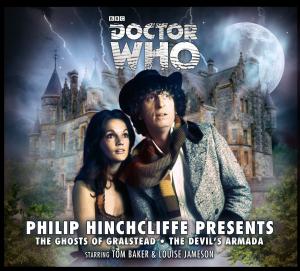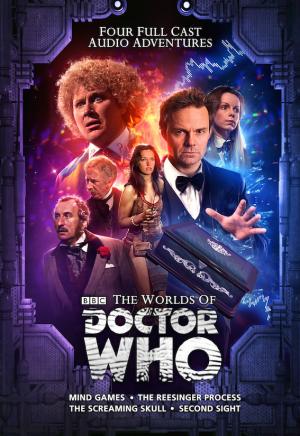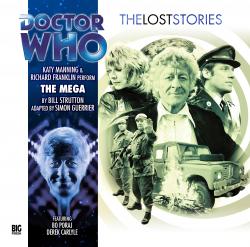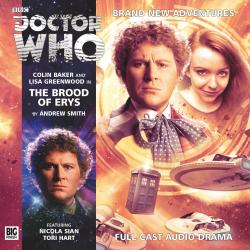Destroy the infinite
Tuesday, 28 October 2014 - Reviewed by

Destroy the infinite
Written By: Nicholas Briggs
Directed By: Nicholas Briggs
Casting:
Tom Baker (The Doctor), Louise Jameson (Leela), David Sibley (The Eminence), Michael Fenton-Stevens (Moorson), Clive Mantle (Tillegat/Lieutenant Treeves), Hywel Morgan (Larivan/Lieutenant Garrett), Christine Roberts (Sarla), Ian Hallard (Davent/Infinite Warrior)
Released June 2014
This story in the Fourth Doctor Adventures range sees Leela and the Doctor land on the planet Delafoss, with the Time Lord stating that he recognises it by the trees. Nothing is quite as it seems, as demonstrated in a scene prior to their landing. We see a man identified as Larivan being transformed into a so-called “Infinite warrior” by an entity only known as “the Eminence”. When the Doctor and Leela eventually encounter him, he explains he was forced to take the “breath of forever”, which starts the transformation. However, he is unable to elaborate any further as he is wracked by pain. The Doctor and Leela seek help from a resistance group, engaged in a war with the Eminence and the forces it commands.
Leela’s father is again mentioned as seen in previous stories like The Evil One, in reference to supernatural forces being constructed around fear and misunderstanding. Just as Leela begins to speak, however, a patrol of Infinites discover the existence of the hideout. The Doctor, yet again being seen as a man with a very unclear plan as in previous stories, displays an air of almost new era glee as he makes the patrol believe they should turn back. Convincing the resistance group that they will be of use, the party resolves to go to “the construction pit” and provide photographic evidence of a new Eminence battleship, ironically named “The Infinite”.
After traversing a large and potentially deadly exhaust tunnel and coming out through a service exit, The Doctor, Leela, Sarla and Tillegat see vast lines of people entering the mammoth craft. As filming of the ship continues, it becomes clear through dialogue that the people are hostages. After being detected by Larivan, as well as beating a hasty retreat, the party split up to stand a better chance of escaping. When the Earth alliance ship arrives, a squad of Infinite warriors meet it with Tillegat sustaining a fatal wound. The scene then shifts to the commander of the Infinite warriors who, along with a comrade, witness the arrival of an Eminence casket. The episode resolves itself with a cliff-hanger implying that The Doctor must be captured, in a fashion not dissimilar to original Fourth Doctor TV offerings.
The second episode opens with Leela climbing reluctantly aboard the ship, but hijacking it using a Janus thorn whilst doing so. It turns out that both her and The Doctor both wish to return to the TARDIS, even though the evil that still enfolds the planet has not yet been vanquished. The Earth Alliance pilot and Sarla are both very confused, but this is all left unresolved as the ship is forced to flee from not only fire on the ground, but in the planet’s atmosphere as well.
A rather touching scene ensues with the Doctor attempting to reawaken the suppressed memories within their would be executioner, cut short by an outburst from the enraged man. A call from the commander of the Infinites, Zarith, halts the execution.
The Doctor and Leela then fight for separate goals – Leela to get back to the planet’s surface to be reunited with the Doctor, who ends up simply trying to stave off taking the “breath of forever”. Everything seems to go downhill from here in terms of an impending disaster, with both the Earth alliance and the Infinite warriors seeking to obliterate the opposition. Leela witnesses the stubborn controller of the Earth Alliance lose his nerve as he sees the annihilation of a large portion of his fleet, thus ordering them to turn tale and break off the attack.
The Doctor meets the Eminence for the first time, seemingly in an inescapable situation, whilst Leela convinces the controller of just how useful she can be in providing ideas for the war effort. This interesting overlap works well, as we see the Doctors potential peril coupled with Leela’s calm and cool tactical instincts. The stakes are raised even further when the Doctor, seemingly under the control of the Eminence, delivers a chilling message that, although unnerving the members of the Earth Alliance, only strengthens their resolve to continue the fight.
In an almost too obvious homage to Star Wars, A disguised Leela and the Earth Alliance forces engage in a last desperate attempt to attack the Infinite and rescue the Doctor, the outcomes and intricacies of which I will leave in ambiguity, open to interpretation.
The Doctor and Leela, as with the other stories this season, are played well by Baker and Jameson, accompanied by a well-fitting score appropriate to the military setting. However, the only criticism I feel worthy of note has to be the voices of the Infinite warriors, who do not, in my opinion live up to their cadaverous nature. However, in a sense their voices almost take on a retro quality, befitting of the era. The rest of the cast do a great job, with parallels almost present to the stereotypes of World War II RAF pilots, fighting for the right to freedom and even using humour just to get them through situations.
All in all, “Destroy the Infinite” leaves many interesting questions open, which gives rise to a Sixth Doctor audio sequel, The Seeds of War. With a cast, that for the most part, does a great job in spite of some slightly less impressive vocal manipulation, I think this story is one that’s definitely worth a listen and is interesting in the fact that it raises more questions than it solves. The score, acting and sound design are all to the usual high standard the majority of listeners will have come to expect, topping everything off with an adversary for the Time Lord who feels like something straight out of an original Tom Baker episode.












